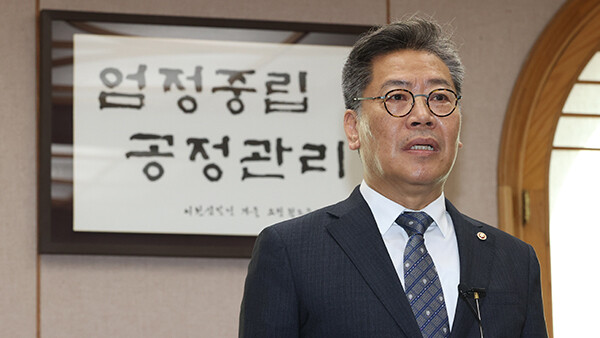
South Korea's National Election Commission (NEC) is reeling from a massive hiring scandal, with top officials facing mounting pressure to resign. The controversy erupted during a parliamentary hearing on June 6th, when NEC Secretary-General Kim Yong-bin urged ten individuals implicated in the scandal to step down.
"There is a growing demand within the organization for these individuals to take responsibility and resign voluntarily," Kim stated during the hearing.
However, the NEC is facing significant legal obstacles in its efforts to dismiss the employees involved. Kim explained that due to Article 45, Clause 3 of the National Public Officials Act, enacted on December 8, 2021, the provision to revoke the appointments of those involved in hiring irregularities cannot be applied retroactively. As a result, only one of the ten individuals is eligible for dismissal.
This legal constraint has drawn sharp criticism from lawmakers. Kim Seong-hoe of the Democratic Party of Korea lambasted the NEC, questioning, "Is the NEC a gang organization?" In response, Secretary-General Kim stated that the individuals in question had been placed on standby.
The scandal centers on allegations of nepotism and favoritism in the hiring process, with accusations that children of high-ranking NEC officials received preferential treatment. Former Secretary-General Park Chan-jin and former Vice Secretary-General Song Bong-seop have faced backlash for appearing to deflect responsibility regarding their children's resignations, stating it was a "personal decision." Lawmaker Cho Eun-hee of the People Power Party criticized their stance, asking, "Who can trust the NEC when they use 'daddy's 찬스' for hiring and then blame their daughters for resignations?"
The scandal has ignited a fierce political battle between the ruling and opposition parties over the need for NEC reforms. Lee Man-hee of the People Power Party asserted that dismissing those involved in the hiring irregularities aligns with public sentiment. Kim Dae-woong, a nominee for the NEC, responded that he would "review the matter strictly in accordance with the law and principles."
The parties are also clashing over the scope of the NEC's audit authority. Secretary-General Kim called for "equal treatment" with the National Assembly, the judiciary, and the Constitutional Court, but the People Power Party criticized this as an attempt to reject external oversight.
Adding to the political tensions, Democratic Party lawmaker Lee Kwang-hee questioned Kim Dae-woong about the possibility of election fraud, citing a video of President Yoon Suk-yeol's impeachment trial. Kim Dae-woong dismissed the concerns, stating that "court rulings have confirmed that such incidents did not occur." He also expressed caution regarding the People Power Party's proposal to abolish early voting, emphasizing the need for "consensus-building."
In response to the escalating scandal, the People Power Party has introduced a Special Inspector Act as a party-sponsored bill. The legislation aims to establish a special inspector, recommended by the National Assembly, with the authority to audit all NEC operations and demand disciplinary actions. The party has likened the NEC scandal to previous controversies, such as the Incheon International Airport Corporation (InGong) and Cho Kuk scandals.
[Copyright (c) Global Economic Times. All Rights Reserved.]






























